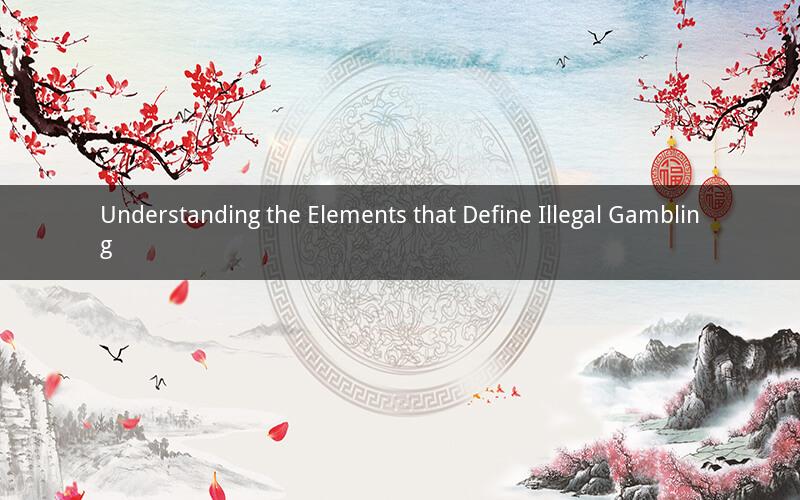
Illegal gambling is a significant concern in many countries, as it poses numerous risks to individuals, communities, and the economy. Defining what constitutes illegal gambling is essential for law enforcement and individuals to comply with the law. This article delves into the various elements that define illegal gambling and explores the implications of engaging in such activities.
1. Definition of Illegal Gambling
Illegal gambling refers to any form of gambling that is conducted without a valid license or in violation of gambling laws. It encompasses a wide range of activities, including casino games, sports betting, poker, and lottery games. The primary aim of illegal gambling is to provide participants with an opportunity to win money or other prizes, but it also poses numerous risks, such as addiction, financial loss, and criminal activities.
2. Unlicensed Gambling Operations
One of the primary elements that define illegal gambling is the lack of a valid license. In many countries, gambling operations must obtain a license from the relevant regulatory authority to operate legally. An unlicensed gambling operation is one that operates without such authorization, making it illegal. This includes both online and offline gambling platforms.
3. Illegal Gambling Activities
Illegal gambling activities can take various forms, including:
- Black market gambling: This involves gambling activities conducted outside the legal framework, such as in backrooms or private homes.
- Underage gambling: Gambling by individuals under the legal age limit is considered illegal in many jurisdictions.
- Illegal sports betting: Betting on sports events without a valid license is illegal in many countries.
- Illegal online gambling: Operating an online gambling platform without a license or in violation of gambling laws is considered illegal.
4. Risks of Illegal Gambling
Engaging in illegal gambling poses numerous risks, including:
- Addiction: Illegal gambling can lead to addiction, as individuals may become fixated on winning money, leading to significant financial and personal consequences.
- Financial loss: Illegal gambling can result in substantial financial losses, as participants may bet beyond their means.
- Criminal activities: Illegal gambling operations often involve criminal activities, such as money laundering and organized crime.
- Legal consequences: Individuals caught engaging in illegal gambling may face legal consequences, including fines and imprisonment.
5. The Role of Law Enforcement
Law enforcement agencies play a crucial role in combating illegal gambling. They work to identify and shut down illegal gambling operations, investigate criminal activities related to gambling, and enforce gambling laws. This includes conducting raids, seizing assets, and arresting individuals involved in illegal gambling.
6. Conclusion
In conclusion, illegal gambling is a significant issue that poses numerous risks to individuals and communities. Understanding the elements that define illegal gambling, such as unlicensed operations and illegal activities, is essential for law enforcement and individuals to comply with the law. By recognizing the risks and consequences of illegal gambling, individuals can make informed decisions and contribute to a safer and more regulated gambling environment.
Questions and Answers:
1. What is the primary aim of illegal gambling?
Answer: The primary aim of illegal gambling is to provide participants with an opportunity to win money or other prizes, often without the necessary legal oversight.
2. Why is it important for gambling operations to obtain a license?
Answer: Obtaining a license ensures that gambling operations comply with the law, provide fair and transparent services, and contribute to the economy through taxation.
3. Can individuals be held legally responsible for participating in illegal gambling?
Answer: Yes, individuals can be held legally responsible for participating in illegal gambling, as they are considered to be aiding and abetting the illegal activity.
4. How can law enforcement agencies identify illegal gambling operations?
Answer: Law enforcement agencies can identify illegal gambling operations through various means, such as informants, surveillance, and online investigations.
5. What are some of the consequences of engaging in illegal gambling?
Answer: The consequences of engaging in illegal gambling can include addiction, financial loss, criminal activities, and legal penalties such as fines and imprisonment.